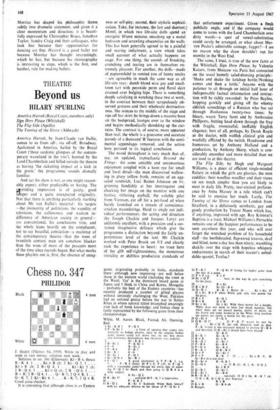THEATRE
Beyond us
HILARY SPURLING
America Hurrah (Royal Court, members only) Sista Here Please (Whitehall) The Flip Side (Apollo) The Taming of the Shrew (AkIwych)
America Hurrah, by Jean-Claude van Itallie, comes to us from off-, via off-off, Broadway. Acclaimed in America, hailed by the Royal Court ('three sardonic glimpses a the contem- porary wasteland in the usn'), banned by the Lord Chamberlain and billed outside the theatre as having 'the sickening impact of a kick in the groin,' the programme sounds dismally familiar.
And yet the show is not, as one might reason- ably expect, either predictable or boring. The on-riding impression is of gaiety, good fetnper and a quite unexpected originality. Not that there is anything particularly startling about Mr van Itallie's material : his targets —the insincerity of politicians, the vapidity of television, the callousness and wanton in- difference of American society in general— are conventional, his conclusions trite, and the whole leans heavily on the complacent, not to say boastful, conviction—a mainstay of the contemporary theatre—that the woes of twentieth century man are somehow blacker than the woes of most of the peasants most of the time since records began. But what marks these playlets out is, first, the absence of smug-
ness or self-pity; second, their stylistic sophisti-
cation. Take, for instance, the last and shortest-) Motel, in which two life-size dolls spend an energetic fifteen minutes smashing up a motel bedroom and scrawling obscenities on the walls. -
This has been generally agreed to be a painful' and searing indictment, a view which takes small account of what actually happens on stage. For one thing, the sounds of breaking, crunching and tearing are in themselves ex- tremely pleasant. For another, the dolls—made of papiermacM to remind you of funny uncles —are agreeable in much the same way as all life-size toys : dumb blond wise guy and small- town tart with peroxide perm and floral skirt strained over bulging hips. There is something deeply satisfying in watching these two at work, in the contrast between their scrupulously ob- served gestures and their wholesale destructive-
ness. She minces to the middle of the stage and rips off her skirt; he brings down a massive boot
on the bedspread, lounges over to the window and begins methodically shredding up the cur- tains. The contrast is, of course, more apparent than real; the whole is a gruesome and accurate parody of a thousand 'B' features with the senti- mental appendages removed, and the action here pursued to its logical conclusion.
The mood throughout is very much that of, say, an updated, transatlantic Beyond the Fringe: the same amiable and uncensorious enjoyment coupled with a keen eye for small and local detail—the man discovered wallow- ing in gluey yellow froth, remains of an egg- salad sandwich; Luci Baines Johnson on Tv, grinning fiendishly at her interrogator and checking her image on the monitor with one furtive, slithering eyeball; the voluble pilot from Vietnam, cut off for a pet-food ad when barely launched on a stream of conscience- stricken maunderings. Hard to single out indi- vidual performances; the acting and direction (by Joseph Chaikin and Jacques Levy) are uniformly excellent, with a precision and a sus- tained imaginative delicacy which give the
programme a distinction beyond the fairly un- pretentious level of the text. Mr Chaikin worked with Peter Brook on US and clearly took the experience to heart: no trace here of the glib self-righteousness, the monstrous
triviality or shiftless production standards of
that unfortunate experiment. Given a fresh publicity angle, and if the company would come to terms with the Lord Chamberlain over dirty words—a spot of vowel-substitution could surely be arranged, or what about Mer- vyn Peake's admirable coinage, fugger?—I see no reason why the show shouldn't run for months in the West End.
The same, I trust, is true of the new farce at the Whitehall, Sign Here Please, by Valentin Kataev, from Moscow via Paris but concocted on the usual homely salad-dressing principle: 'Shake and shake the ketchup bottle/Nothing comes and then a lottle.' Anyone with the patience to sit through an initial half hour of indispensable factual information and instruc- tion will be richly rewarded: by Peter Bayliss, hopping gawkily and giving off the wheezy eldritch screechings of a Russian who has sat through Rashomon twenty-two times; by bleary, weary Terry Scott and by Ambrosine Phillpotts, butting head down through the fray with fragile, resourceful, ineffably English elegance; best of all, _perhaps, by Derek Royle as the doctor, with wolfish clinical grin and woefully afflicted by the twitch. Handsome and humorous set by Anthony Holland and a production, by Anthony Sharp, which is con- siderably smoother and more detailed than we are used to at this theatre.
The Flip Side, by Hugh and Margaret Williams, is a piece of efficient single-minded flattery in which the girls are glossier, the men cuddlier, their woollies woollier and their views on sex much simpler than you are likely to meet in daily life. Pretty, tear-stained perform- ance by Anna Massey in a role which can't be said to exercise her much. Lastly, The Taming of the Shrew comes to London from Stratford, in a deliciously acrobatic, gay and gaudy production by Trevor Nunn which has, if anything, improved with age. Roy Kinnear's Baptista is a treat, Michael Williams's Petruchio remains one of the happiest performances to be seen anywhere this year, and who will ever forget the wretched problem of his household staff—the beetleheaded, flap-eared knaves, deaf and blind, none a day less than ninety, wambling shakily over the stage with hopeless whispery endearments in search of their master's unbid- dable spaniel, Troilus?






























 Previous page
Previous page